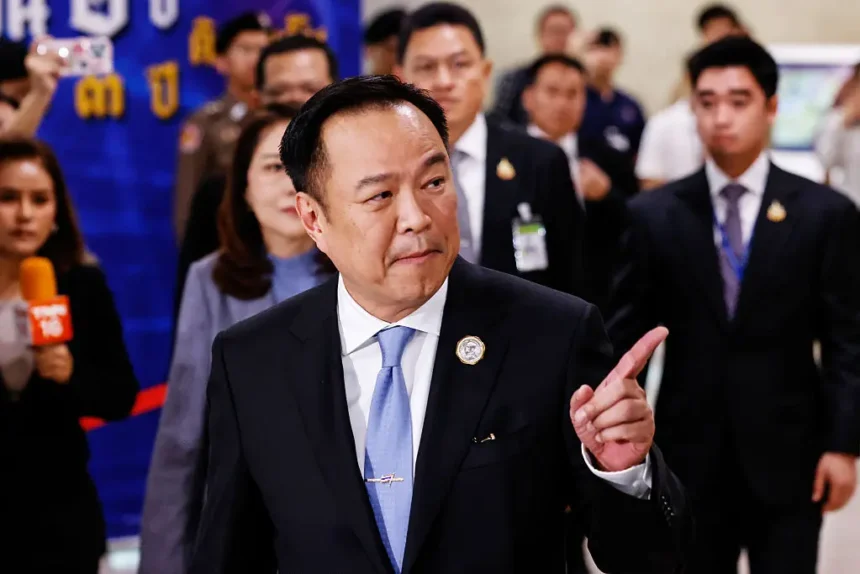BANGKOK – The House of Representatives has elected Anutin Charnvirakul as Thailand’s 32nd Prime Minister, marking the country’s first minority government in five decades. Within four weeks, a new Cabinet will be formed.
The process then moves into a six-month phase focused on amending the constitution, dissolving the parliament, and organizing new elections. The Thailand Development Research Institute (TDRI) suggests the government should increase VAT to 10 percent to boost revenue.
Three key ministries—Finance, Foreign Affairs, and Commerce—are expected to see appointments from outside the main parties. Political analysts predict tensions related to global conflict and international trade taxes.
Newly appointed Finance Minister Pichai encourages attracting more foreign investment. The Stock Exchange of Thailand urges the new Cabinet to support the capital markets, while the Federation of Thai Industries asks for a reduction in land tax until the economy recovers. Business leaders say that the second half of the year lacks positive drivers and expect weak consumer spending.
Minority government after 50 years
Reporters from Prachachat Business detailed the urgent parliament session, where members selected the new Prime Minister as outlined in Article 159 of the 2017 constitution. Parliament president Wan Muhamad Noor Matha presided over the session.
Bhumjaithai Party brought together 146 MPs and also reached a deal with the People’s Party, which commands 143 MPs. This agreement led to Anutin Charnvirakul becoming Prime Minister and heading a special government tasked with resolving the Thai-Cambodian border crisis, organizing a constitutional referendum, and dissolving parliament within four months.
No single party held a majority, so Bhumjaithai led a coalition government of 146 seats. This is the first minority government in 50 years, a situation last seen during the tenure of MR Seni Pramoj of the Democrat Party after no party won a majority in the 1975 election. Back then, even after MR Seni was confirmed as Prime Minister, his government did not last long, collapsing after just one month.
Anutin’s election proceedings
During the House meeting, two candidates were nominated for Prime Minister. Bhumjaithai put forward Anutin Charnvirakul, while Pheu Thai nominated Chaikasem Nitisiri.
MPs voted by open ballot, calling names in alphabetical order. According to the constitution, the new Prime Minister needs more than half of the votes, or at least 247 out of 492 MPs.
Ahead of the vote, Deputy Parliament President Chaiya Promma allowed two hours for MPs to debate and outline their support for either candidate. The final vote count saw Anutin winning with 311 votes, compared to 152 for Chaikasem, and 27 abstentions, out of 490 MPs present.
Cabinet formation in four weeks
After the vote, the Parliament President will formally submit Anutin’s name for royal endorsement. Once the King appoints the new Prime Minister and the oath-taking ceremony occurs, the new Cabinet list is prepared and submitted for final royal approval. Bhumjaithai expects this process to take roughly two to three weeks.
Under the Memorandum of Agreement with the People’s Party, the government must dissolve the parliament within four months, handing over to a caretaker government for about two more months ahead of elections. This timeline also hinges on a Constitutional Court decision regarding the number of referenda required for constitutional amendments.
If three referenda are needed, the first will be conducted before any constitutional change, requiring Cabinet approval and coordination with the Election Commission for a date, no sooner than 90 days and no later than 120 days, and ideally not clashing with the general election.
If only two referenda are needed, the Cabinet must quickly push the charter amendment bill to allow for a Constitution Drafting Assembly. Once parliament passes the amendments, the House Speaker will inform the Prime Minister and send out the amendment text and a summary for public understanding. The Election Commission will then set a referendum date within the 90–120-day window.
Once all constitutional requirements are met, parliament will dissolve and elections will be held within 45 to 60 days in line with legal requirements. The government will continue in a caretaker role until the new government takes office.
Expected Cabinet appointments
In the projected Cabinet, coalition partners are likely to receive one ministerial post for every four MPs. The leading party, however, will reserve economic ministries for outside experts to bolster public and investor confidence.
Sources report that Bhumjaithai will control key Ministries like the Interior (with Anutin doubling as Prime Minister and Interior Minister), Transport, Digital Economy, Higher Education, and the Prime Minister’s Office. Traisulee Traisanakul is tipped as Secretary to the Prime Minister.
Other coalition partners will steer their usual ministries, such as Agriculture and Education, plus possibly Social Development and Human Security, with returning figures like Narumon Pinyosinwat and Attasith Sirilatyakorn expected to be appointed.
The United Thai Nation Party, led by Suchart Chomklin, has 16 MPs and strong candidates for Natural Resources, Industry, and Labour.
Palang Pracharath may take over the Defence and Energy portfolios, with links to Gen Prawit Wongsuwan and Santi Prompat, respectively.
Crucially, economic ministries such as the Deputy PM for Economic Affairs, Finance, Commerce, and Foreign Affairs are expected to be led by experienced experts outside of parliament.
Ten major challenges facing the new government
Chulalongkorn University political scientist Professor Surachart Bamrungphuk identified ten major issues facing the new administration. These include the ongoing Thai-Cambodian dispute, which could escalate further. Violence in Thailand’s deep south remains a major security problem. Political conflict continues, keeping parliament weak and the political climate unstable.
Economic stress tops the list, with household debt strangling Thai families. The threat from international tariffs, especially US trade barriers, could further hit Thailand’s struggling economy.
Perhaps the biggest concern is the public’s faith in politics and its leaders. Surveys indicate growing disillusionment and fatigue with all major parties.
Additional concerns include the civil war in Myanmar, rising online scams and gambling, drug trafficking, cross-border pollution, and competition between global powers.
Finance Minister calls for investor confidence.
Deputy Prime Minister and Finance Minister Pichai Chunhavachira assured that government operations remain on track and policies continue, whatever the political climate. He stressed that maintaining economic and financial stability remains a top priority.
He also emphasized the government’s commitment to attract foreign direct investment, highlighting collaboration with state agencies, the Thai Chamber of Commerce, and the Federation of Thai Industries.
Pichai said that he would continue to give guidance to public officials during his remaining time. He believes Thailand can move forward and that key economic functions will continue regardless of political change.
Stock Exchange chief urges economic clarity
Assetdej Khongsiri, Executive Director and Manager of the Stock Exchange of Thailand, said ongoing political uncertainty is hampering economic policy, especially budget disbursement. This could impact the economy in the second half of the year and into the next.
He added that while investors are used to political changes, they want to see clear economic policies that can be carried out. A stable government and a clear direction would help restore confidence and attract new investment.
Assetdej hopes the new economic team will understand the importance of capital markets as sources of funding and tools for economic development. He said the market is more than a trading platform; it encourages saving, investment, and finance for broader economic growth.
TDRI urges VAT hike
Nipon Phuapongsakorn, an honorary academic with TDRI, recommended three urgent points for the new government, which only has a window of four to six months. First, Thailand must urgently address trade disputes with the US and introduce protective measures. All stakeholders, from agriculture to industry and vulnerable groups, need to be part of the discussions and support measures that help keep the nation competitive and protect GDP.
Second, Thailand’s budget deficit is high, so Nipon advises raising VAT from 7 percent to 10 percent to increase state revenue. He argues this is necessary for funding stimulus plans and to avoid more borrowing.
Nipon adds that with the possibility of outside experts leading the Finance, Commerce, and Foreign Affairs ministries, the government has the chance to make bold decisions that help restore stability and economic confidence.
Third, he calls for a revamp of the country’s economic structure. Thailand’s growth rate remains the lowest in ASEAN (apart from Myanmar). To improve, the government should bring all parties to the table to create clear and practical development plans.
Federation of Thai Industries proposes land tax relief
Kriengkrai Thiennukul, Chairman of the Federation of Thai Industries, underlined the need for a strong, decisive Prime Minister who can make tough calls to drive economic recovery and boost investor confidence. He also supports ongoing projects such as soft loan measures for exporters affected by tariff pressures.
From the private sector’s perspective, they want the government to delay or cut land and property taxes by at least 50 percent in 2026 or until the economy fully recovers. This would reduce costs, increase cash flow, lower the risk of business closures, and stimulate local economic activity.
PTG Energy calls for long-term economic policy
Rangsant Puangprang, Chief Financial and Sustainability Officer of PTG Energy, hopes the new government will issue clear, long-term policies rather than short-term fixes. He believes budget allocations should reach all businesses, especially small and medium-sized ones.
Limited positive factors for the next 4–6 months
Teerapop Kranlert, Chief Marketing Officer at Maguro Group, said the food and restaurant sector will continue to face a tough market over the next 4–6 months, similar to the first half of the year. With few positive developments, consumer spending is likely to stay low as people remain cautious.
He believes the fourth quarter will better reflect real economic and consumer spending trends. If the new government manages to communicate clearly, restore public confidence, and bring stability, spending could bounce back quickly. Businesses are waiting for signs of policy support and public optimism to return.














